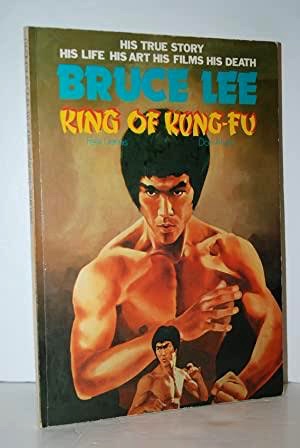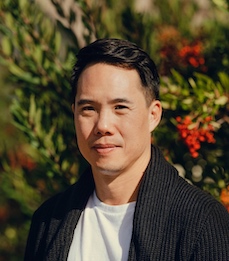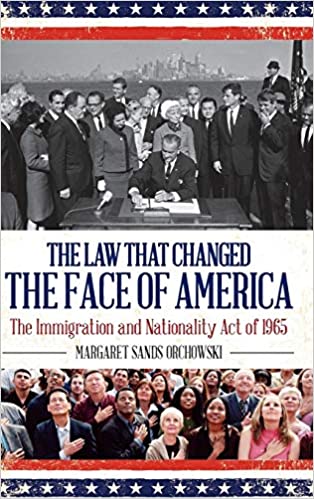Note: This novel was the National Book Award WINNER for 2020.
“Ever since you were a boy, you’ve dreamt of being Kung Fu Guy. You are not Kung Fu Guy. You are currently Background Oriental Male, but you’ve been practicing. Maybe tomorrow will be the day.”
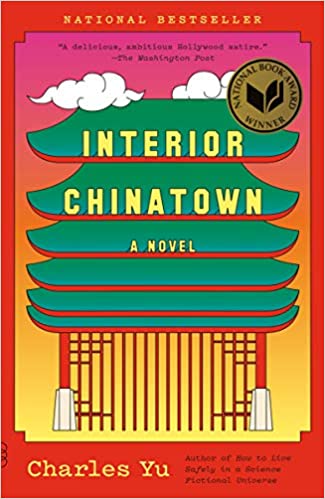
Young main character Willis Wu spends the most important parts of his life at the Golden Palace, a Chinese restaurant/film studio in an unnamed time period in an unnamed English-speaking city. As Willis, whose parents were immigrants, lives his life there and in the broader enclave of Chinatown, his creator, author Charles Yu explores Willis’s reality,quickly constructing level upon level of different “realities” and creating an experimental novel, often satiric, which includes the reader from the opening pages. Visually, the “novel” appears to be a screenplay, its typeface resembling the pre-computer look of a typewritten script. Willis, an actor in a film being made in off-hours at the Golden Palace, is being addressed by an unknown “director,” who may be his own inner self. The “director” is realistic in evaluating Willis’s chances at improving his role from that of Background Oriental Male to his ideal role, that of Kung Fu Guy, the hero. Willis’s family has been in the film business at the Golden Palace for a generation; his father was once a major actor in the films shot there, though his role has now been reduced to that of Old Asian Man. The roles of his mother and Older Brother are also explored in brief paragraphs of introduction, like the role descriptions of a script. Quotations from the action of the film are indented and set off, and possible interpretations are emphasized by the unidentified author/director addressing the unknown reader – “you.”
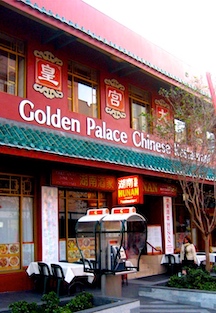
Many Chinese immigrants worked and participated in the making of films at a restaurant called the Golden Palace, which may have resembled this one.
Willis was born in the United States, but he and his Chinese family, like many other Asians, have always lived and worked in Chinatown. Their limited opportunities and outlooks are part of the social fabric of the period, though no dates are provided. Immigration policy in the US from 1921 on, was based on a “National Origins Formula,” allowing foreign-born people to become citizens but not allowing them to own property or businesses. In 1965, the Immigration and Nationality Act was passed by the 89th Congress and signed by President Lyndon Johnson, ending the quota-based National Origins Formula. By then, however, many groups of immigrants had created their own lives in communities, like Chinatown, made up almost entirely of people of their own backgrounds. As Willis and his family live their lives – and maintain memories of their past by participating in the shows and films made at the Golden Palace – the full picture of what is lost to society and to the immigrants who have come to the United States begins to become clearer. Willis, a young man, wants to feel success, and the best way for that to happen, as far as he can see, is to stay where he is and progress through the various roles open to him as a film participant, hoping to move, in time, from Delivery Guy, Silent Henchman, or Generic Asian Man to, eventually, King Fu Guy.
Being Kung Fu Guy is the highest “rank” possible for the films Willis is in, but Willis also “worships” Bruce Lee, considered the King of Kung Fu. Not only did Lee create an entirely new fighting system and philosophical world view, but he was proof that “Not all Asian men were doomed to a life of being Generic.” For Willis and many others, Lee was “Not a man so much as a personification, not a mortal so much as a deity on loan to you and your kind for a fixed period of time. A flame that burned for all yellow to understand, however briefly, what perfection was like.” Willis’s older brother was also “an A-plus-plus” in Kung Fu, could “grab the rim” in basketball, excelled at karaoke, spoke Korean, and, best of all, was a National Merit Scholar with a 1570 on the SAT. He was “the ideal mix of assimilated and authentic.” And then, suddenly, it was over. “The dream had ended,” and Older Brother disappeared from his life. Before long, Willis himself has died in one of the episodes in which he has been acting, and that automatically requires him to stay out of film for 45 days of unpaid leave, a difficulty for him on all fronts.
When Willis finally returns to acting, he meets Karen Lee, a young woman with one quarter Taiwanese heritage, with whom he falls in love. Eventually, however, Karen gets her own show and leaves Chinatown for the suburbs. Willis is close to being Kung Fu Guy, and stays behind hoping to achieve success so that he can then join Karen. Eventually, Willis sees how limited his outlook has been, and in a long-delayed epiphany, he heads to the suburbs to touch base again with Karen. In the process he commits a crime for which he will face serious consequences. The trial is a classic comedy sketch, built around the fact that his lawyer’s defense is based, in part, on the fact that the Chinese are “legally” Indians because both groups were descended from the same Asiatic ancestors, a case litigated in 1850. Long-standing issues of race in America come to the fore, as Willis and others recognize that even if someone is Kung Fu Guy, he is still guilty of playing the role of a Generic Asian Man, someone who has not assimilated. The conclusion contains an unexpected twist.
A book that is in many ways unique, Interior Chinatown makes a clear case regarding inequality and the ways that members of minority groups may sometimes encourage it unwittingly – as in becoming a “generic” character. These conclusions, however, are developed within a novel which has great humor, irony, and a sense of understanding for the victims and the lives they sometimes choose to live. Reality here is multi-leveled – the “novel” is actually a fictional screenplay, the characters are often playing generic roles, “dead” people can sometimes return to life, and big change is not only possible but even encouraged. At the end of the book, Willis encapsulates a new philosophy: “You are not Kung Fu Guy….Take what you can get. Try to build a life. Sometimes, things happen. Mostly they don’t. Sometimes you get to talk. Mostly you don’t. Life at the margins, made from bit pieces.”
Photos. Many Chinese immigrants worked and participated in the making of films at a restaurant called the Golden Palace, which may have resembled this one. https://www.weekendnotes.com
The pictured biography of Bruce Lee gives his philosophy of life and the importance of Kung-Fu. Willis Wu worshipped him and his achievements. https://www.abebooks.com
The author photo is from https://www.nytimes.com
THE LAW THAT CHANGED THE FACE OF AMERICA, about the Immigration and Nationality Act of 1965 is written by Margaret Sands Orcowski. https://www.amazon.com
